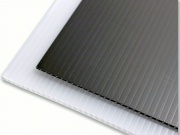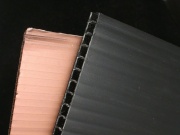Coroplast
Description
[PEL] A brand name for a rigid corrugated plastic board sandwiched between two sheets of thin Plastic. Coroplast® is composed of a high-impact copolymer of Polypropylene and Polyethylene. The moisture repellent sheets are light, strong, and acid-free. Coroplast® boards are used for enclosures, frames, backing, and supports. Chemically, the sheet is inert, with a NIL pH factor. At regular temperatures most oils, solvents and water have no effect, allowing it to perform under adverse weather conditions or as a product component exposed to harsh chemicals. All Coroplast® twin-wall profile sheets can be modified with additives, including UV protection, anti-static, flame retardant and color.
Synonyms and Related Terms
Coroplast® [Coroplast]
Applications
- Enclosures and frames
- Backing and support
Personal Risks
Coroplast® is combustible and may release harmful toxins at temperatures of 600 degrees F.
See Coroplast® health and safety sheet [[1]]
Collection Risks
Some products may contain additive and coatings.
Physical and Chemical Properties
Will not burst on Mullen tester. Sheets are 4 mm thick.
| Melting Point | 162.2 |
|---|---|
| Density | 90 g/cc |
Working Properties
Coroplast® may be cut or scored with a utility knife and bent with heat. It also may accumulate a static charge.
Forms/Sizes
Available in a variety of thicknesses ranging from 2-6 mm.
Additional Information
Preservation Equipment: Website
Sources Checked for Data in Record
- Pam Hatchfield, Pollutants in the Museum Environment, Archetype Press, London, 2002
- A Glossary of Paper Conservation Terms, Margaret Ellis (ed.), Conservation Center of the Institute of Fine Arts, New York City, 1998
- Website address 1 Comment: www.preservationequipment.com/367.html
- Website address 2 Comment: Preserv'Art at http://preservart.ccq.mcc.gouv.qc.ca/ProduitFiche.aspx?NoProduit=P0030

